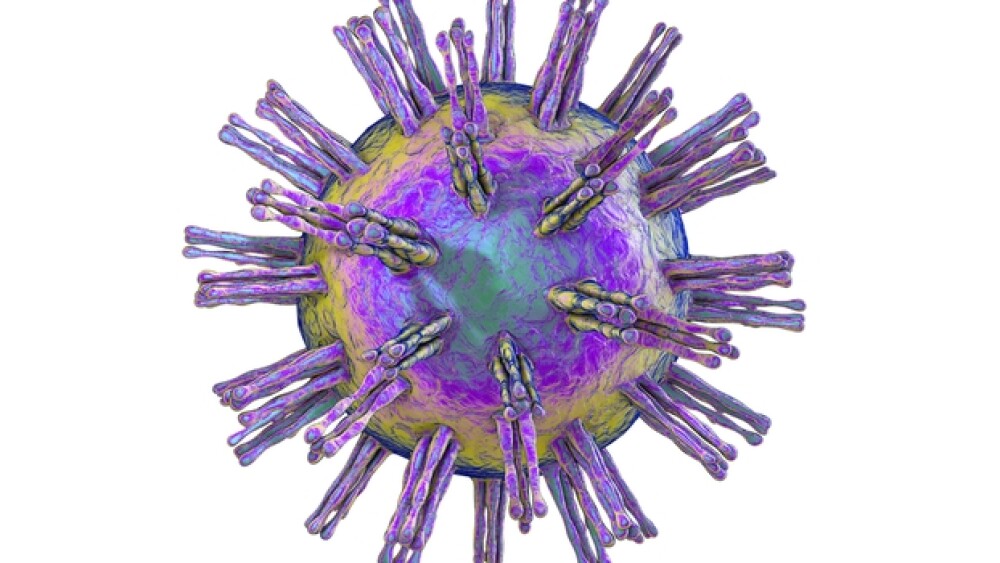There are currently three antivirals approved by the U.S. Food and Drug Administration (FDA) for genital herpes. They are acyclovir (Sitavig and Zovirax), valacyclovir (Valtrex), and famciclovir (Famvir). There are no approved vaccines.
In July of this year, Excell Biotech launched to develop vaccines and gene therapies for viral infections and autoimmune diseases. The company, in particular, noted its plans to develop a vaccine, EXD-12, for the Herpes Simplex virus. HSV-1 is responsible for oral herpes, such as cold sores, and HSV-2 is responsible for genital herpes. HSV-1 can cause genital herpes, but most cases of genital herpes are caused by HSV-2.
In the U.S., one in two people have HSV-1 and one out of six age 14 to 49 have genital herpes. HSV-1 is a major cause of blindness and life-threatening encephalitis.
There are currently three antivirals approved by the U.S. Food and Drug Administration (FDA) for genital herpes. They are acyclovir (Sitavig and Zovirax), valacyclovir (Valtrex), and famciclovir (Famvir). There are no approved vaccines.
The market for vaccines is not a particularly economically sound one—largely because if effective, you take it once in your lifetime and you’re done. A current exception is the yearly vaccine for influenza, which is re-engineered every year based on the likelihood of the most common strains predicted.
Despite that, the Pharmaceutical Research and Manufacturers of America (PhRMA), there are 264 vaccines in development to prevent and treat diseases. These include infectious diseases (137), cancer (101), allergies (10), autoimmune disease (8) and Alzheimer’s disease (4).
Recently, the European Commission approved the world’s first Ebola vaccine. The vaccine is manufactured by Merck & Co. and has a trade name of Ervebo. On November 7, Takeda Pharmaceutical announced that its dengue fever vaccine hit its primary efficacy endpoint in its Phase III clinical trial. The trial evaluated the vaccine in 20,000 patients in Latin America and Asia.
And those are just two recent stories about major breakthroughs in vaccine development. Despite limiting economics, the public health need for vaccines is enormous. Vaccines also provide an unusual return on investment. Not only have vaccines eliminated or minimized some of the most serious infectious diseases the world has ever known, a 2016 Johns Hopkins University study found that for every dollar invested in vaccination in the 94 lowest-income countries in the world, $16 were expected to be saved in healthcare costs, lost wages and lost productivity. Taking into consideration healthier and longer lives and the long-term burden of disability, the net return increases to $44 per $1 invested.
Excell’s EXD-12 vaccine is a live attenuated virus vaccine. It is currently being tested in laboratory animals. The company indicates it hopes to have its preclinical animal data completed by the end of 2019 and move into the clinic in early 2020.
Researchers from the Perelman School of Medicine at the University of Pennsylvania announced that they had developed a vaccine against genital herpes in September 2019. The results were published in Science Immunology, describing the vaccine’s effectiveness in mice and guinea pigs. They vaccine provided “sterilizing immunity” to 63 of 64 mice, meaning no trace of herpes infection or disease after the exposure. In 10 guinea pigs, who respond to herpes infections similar to humans, has similar results, with no animals developing genital lesions and only two showing any signs of infection.
“We’re extremely encouraged by the substantial immunizing effect our vaccine had in these animal models,” Harvey Friedman, professor of Infectious Diseases and principal investigator, said at the time. “Based on these results, it is our hope that this vaccine could be translated into human studies to test both the safety and efficacy of our approach.”
Many vaccines use attenuated or dead viruses. Friedman’s approach is a new type of technology, messenger RNA (mRNA). The mRNA molecules code for three HSV2 proteins. Once inside the body, they integrate into the cells and produce the viral proteins, which stimulate an immune response.
Moderna, one of the leaders in mRNA technology, has mRNA-1647 for cytomegalovirus (CMV), which is a member of the herpes virus family. It began a Phase I clinical trial in November 2017, and was scheduled to be completed on July 2020, although neither the company nor ClinicalTrials.gov have filed an update.
Another company working on a herpes vaccine is Jupiter, Florida-based X-Vax. The company’s approach is decidedly different—rather than using attenuated viruses or mRNA, the company is working to delete a gene in the virus hoping to stimulate the body to produce a different and more effective antibody. This “live” vaccine is delta gD-2, and is based on an HSV-2 virus genetically deleted for glycoprotein D (gD-2). In preclinical models it has been effective.
Other companies have given up on herpes vaccines in recent years. Genocea Biosciences had positive Phase II results for GEN-003, but abandoned it in February 2018. The company now has it on a partnering list as being Phase III-ready.
Another company, Vical, abandoned its genital herpes vaccine program after a failed Phase II trial in June 2018. In June 2019, Vical merged with Brickell Biotech, but herpes is not one of the areas the merged companies are pursuing.
Perhaps the efforts by Excell, the University of Pennsylvania or other biopharma companies will lead to a breakthrough.





